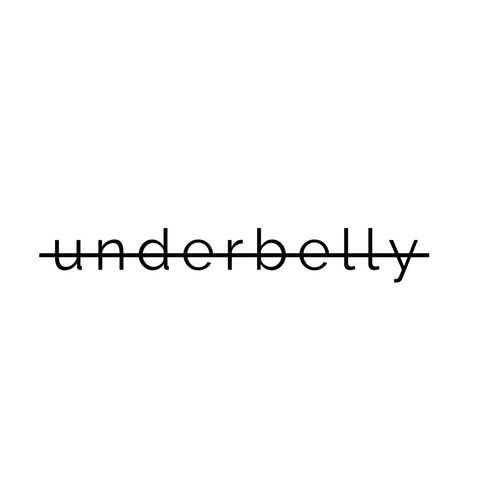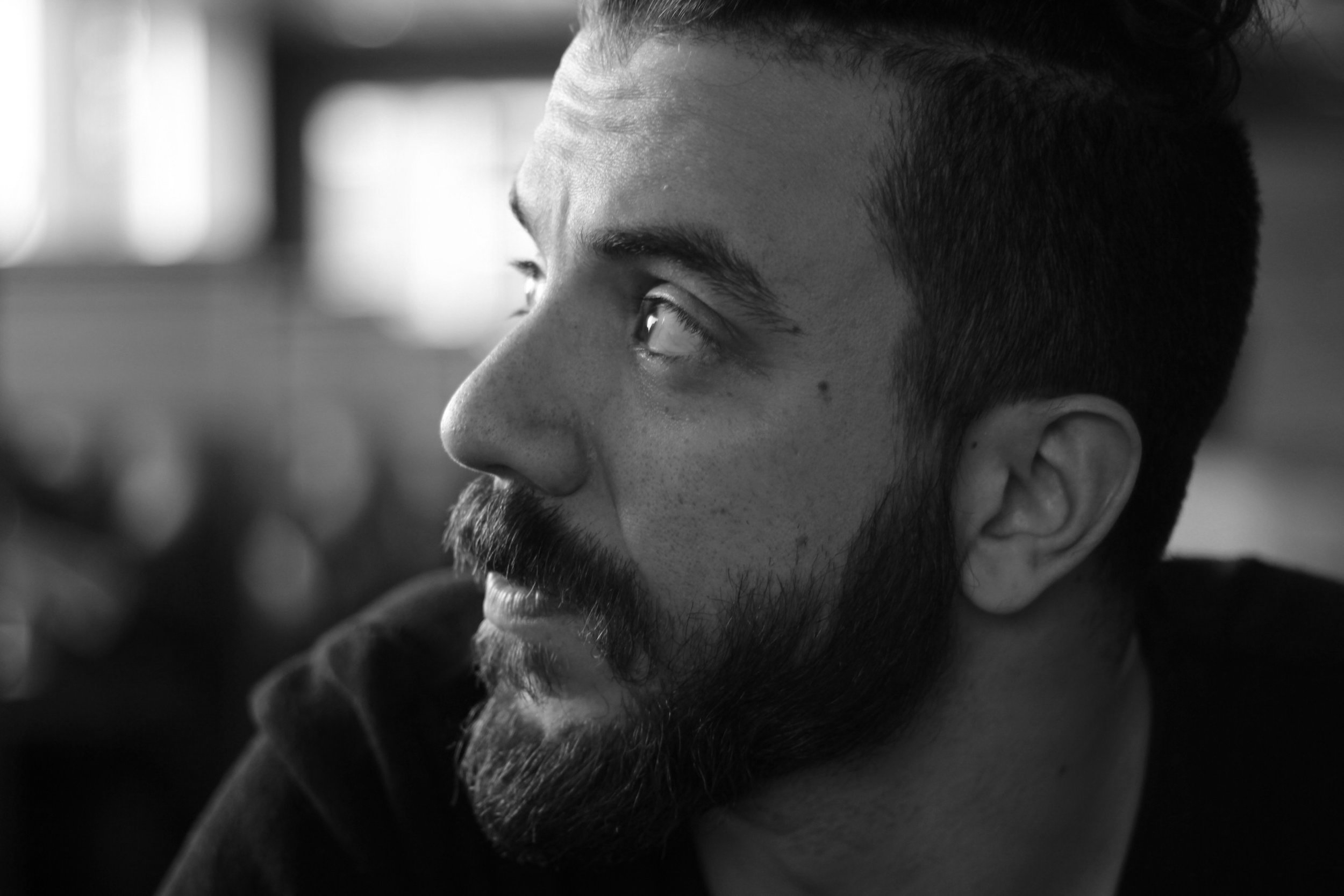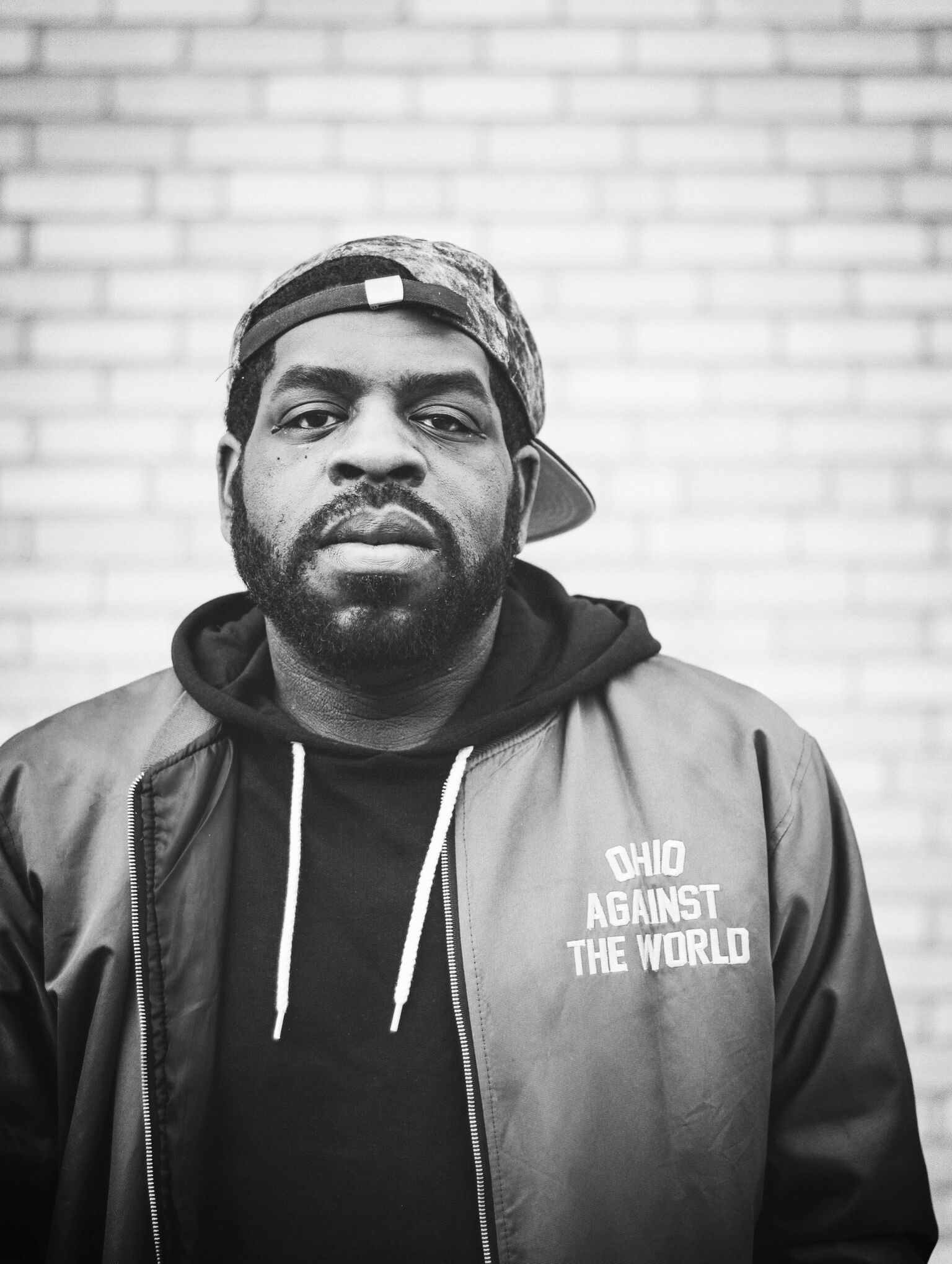Rachel
McKibbens
This poem appears in my most recent full-length book of poems, blud. Of all the poems within the book, this was the one I worked longest on. I’ve probably written this poem six times, published, and moved on, but this one in particular fought me the entire way. As an un-mothered woman, I will always be hungry to discover when motherhood actually happens. I imagine a newborn, newly unhitched from the womb, must earn its relationship with its mother, and vice versa. It took a little more than a year to figure out that the wonder of my children’s curiosity wasn’t the crushing thing I thought it was -- instead, the sorrow was in the speaker understanding maternal nurturing was simply never in the cards for her.
SWELL
I have never had a mother, or, no longer have
or, once did, briefly, for a day or two.
Perhaps she was only mine
during the wet crown of hours I spun my skull
through her ripe & widening cunt,
then fastened to her nipple—
a botched daughter ugly with hunger.
Or maybe it was long before the orphaning,
before the womb fell quiet & her brain
went sour—gentle reader, won’t you permit me
this sweetness?—the morning she straddled
my father, a black flood of hair,
throat opened to God, the red muscle of her quickening
like the pulse of a dazzled child. Yes,
let it be there, in that heat-ravaged
moment as she caught the pale bloom of herself
in the mirror & looking
back over her shoulder
fell in love with the animal engine of her body,
not for the daughter it could nurture,
but for the girl it would kill.
SWELL
My children know,
without me telling them,
I no longer have a mother.
Or,
never had.
Or,
once did, briefly,
for a day
or two
or maybe
just in that hour
as I turned my skull
through her
dark & widening cunt.
Or, perhaps, only
those soft, small minutes
following
a blind gasp
as I latched onto her nipple
and tugged—a botched
daughter—ugly with hunger.
My children know,
without me telling them,
I unraveled a woman
with my being,
greeted her voice
with a newborn’s yelp,
wet as a jackal’s.
As I blinked myself
into existence,
her brain went sour.
My children know,
without me telling them,
I am a pile of dishes
a brief mother smashed
against the kitchen floor.
Collapsed milk splitting wood.
And when they ask, gently,
Tell us, tell us what your mother
looks like! I lie. Say, I do not know.
It’s been such a long, long time.
As if her hair, that long
dark funeral,
is not my own.
As if the face
of a ghost
could ever spoil.
Irène Mathieu
The poem "furnace" came from a story my grandmother told me about watching her mother fry calas (beignets) with hard sauce in the same furnace they used for laundry when she was child in 1920s New Orleans. This was in the context of many conversations with my grandmother about her life, as well as my own research about Creole women of color in the early 20th century. I loved the idea of the furnace as a period-specific piece of domestic equipment that could symbolize a variety of things to different people depending on their age and position within a family. I was also interested in how domesticity can be oppressive for women, and how that oppression is learned or inherited. I tend to write into my perceptions, and editing helps me achieve clarity about what I'm perceiving, sometimes with the help of poet-friends. Putting the poem away for a few weeks also is useful; often I keep opening up a poem subconsciously for days or weeks after I've written a first draft. For "furnace," the poet Kimberly Reyes in particular pushed me toward clarity, and after arriving at this final version I was able to better articulate my intentions in this poem.
furnace
a little iron piece of hell blinking hot bellyful of coal
Mother would cast the sheets in, snapping,
and boil down my brother’s urine
our tears
sweat
bloodstains and
the furnace would suck those sheets between its teeth
and spit them back out
so white they hurt your brain to look at the sun on them
or the furnace would digest white rice balls
that Mother would fry into calas steaming with hard sauce
because of the furnace I grew up thinking whiskey and sugar
smelled like fresh laundry
I say the furnace was hell because it was full of such trickery
and so hot
could burn your fingertips two ways to Sunday
and back
I bet Mother hated that furnace
she always looked mad when she had open it
furnace
a piece of iron hell blinking hot bellyful of coal
Mother cast the sheets in, snapping,
to boil down my brother’s urine
our tears
sweat
bloodstains
and the furnace would suck those sheets between its teeth
spit them back out
so white they hurt your brain to look at the sun on them.
or the furnace would digest rice balls
Mother fried into calas steaming with hard sauce
Mother the furnace workhorse, Mother of reddened palms
of chapped and burning fingertips.
because of the furnace I grew up confusing the smells of
whiskey and sugar with fresh laundry
I say the furnace was hell because it was full of such trickery
so hot
could burn your fingertips two ways to Sunday
and back
as if scorching away the mess of us
was the only way to get clean
our sticky fingers, our mussed hair,
to smell good and sharp as hell
washed up with whiskey.
I bet Mother hated that furnace
she always looked mad when she opened it
but she wanted us to be bright, sweet,
even if it meant unfastening a little inferno
and throwing in her skin, boiling liquor.
Emily Jungmin
Yoon
I began writing this poem after my grandmother told me the story (represented in this poem). I knew I wanted it the poem to show the type of tension that one can feel even in distance -- the threat of sexual violence and the presence of multiple languages in Korea during the Korean War. In the revision process, I removed details that just didn't stick in tone and information, and played around with the shape and spacing. I finally settled with the prose-poem-form, because I thought the breathlessness and "unadorned" quality of the form worked well with the content. I used this form with other poems of mine all titled "An Ordinary Misfortune," which speak on various violences against the woman's body, but especially the history of the comfort women of Korea. This poem is one of the earliest one in the series, and originally appeared in Ploughshares.
A Scream at Night
What is fear. Or when.
What is representation. Or present.
What is pressing. What is pressed.
Or who. A woman. A teen.
Her father presses the gates shut.
Presses her into a crate. The crate
into a shed. She unfolds by morning.
Binds her chest.
She walks unwomanned.
An American soldier stands on a small hill
of a small peninsula, smaller than 1/40
of America. He sees the small hills underneath
her bandages and yells: Stop over there!
in Japanese. The language they’ve both learned.
When she runs, she is unmistakably
woman. She falls. He laughs.
What is a female body in a stolen country.
Or whose. The soldiers are young. They fear going out
without a bang. What is right in war.
What is left in war. War hasn’t left Korea.
I have. I fold. I give up, myself,
to you. Which one of you said
let’s have raunchy Korean sex
to me. Do you represent America
to me. Did those soldiers to her. I fear
what if you’re too big for my small
opening. Closing. Opening. Closing
my fingers around you, yours around mine.
Kaveh Akbar
Reyhaneh Jabbari, a 26-year-old Iranian woman, was hanged on October 25th, 2014, for killing a man who was attempting to rape her. I “wrote” the first draft of this poem just days after reading a news story about Jabbari’s execution. In a fugue of grief and confusion and hopeless impotent anger I found a final message she'd given to her mother. It was and is one of the most devastating texts I’d ever read. It ruined me completely. I knew I wanted to speak to her story in some capacity, but I didn’t know how. I thought maybe the secret was in using Jabbari’s own words. I worked all day on an erasure of that final letter, creating the poem “LONG POLISHED NAILS.” Exhausted, I looked at what I had at the end of the day and felt an indescribable but overwhelming offness. I wasn’t sure what it was—at the craft level, I was more or less satisfied with the poem—but something at its core was fundamentally and essentially incorrect. I realize now I was reacting to the wrongness of the whole impulse—why was I erasing the language of a woman who had already been violently erased? Why was I stealing her last earthly possession, her language, from her? I set the poem aside to move fully forward into my grieving.
Over a year later, I still hadn’t revisited that erasure, though I thought often about Jabbari’s horrible story. One morning going through my standard morning writing routine, I noticed a few familiar phrases creeping into what I was writing. I thought maybe I was remembering something I’d read recently, but I couldn’t place the phrases. Google was no help. I searched through my old drafts and realized I was unconsciously pulling language from my “LONG POLISHED NAILS” erasure. That morning, my brain was finally ready to write a poem for Jabbari. “HERITAGE” came out basically in its current form within the next couple hours. It’s still an excruciating poem for me to even look at, and I’ve only read it in front of an audience once, to a very particular group. But I wanted to write this to speak about the whole process, how careless I was in my early wrongheaded attempts at erasure, and how time and faith in the process of grieving saw me through to a small measure of closure. A poem for Reyhaneh.
(originally published in Ninth Letter)
long polished nails
Reyhaneh Jabbari, a 26-year-old Iranian woman, was hanged on October 25th, 2014, for killing a man who was attempting to rape her. This poem is an erasure of Jabbari’s last voice message to her mother.
Night should have taken
my body.
The old story: death
not the end of life.
Face it. Persevere.
As a lady
I did not beg.
I had long, polished nails.
You planted love in me
and I shed my beauty,
shaving my hair.
Don’t cry.
The beauty of wishes
is unending.
My heritage.
Country, listen:
pray and turn
into wind.
God will beat us awake.
Soft-heart—
in the other world
it is you God wants.
Hanif Abdurraqib
This poem was born out of an erasure first. I have really begun to enjoy manipulating song lyrics through poems and finding ways that the lyric can have a new home in a poem format. I love “Idioteque” as a song because there are actually so few lyrics in it – it’s mostly a sonic experience. And so it challenged me to make the most of what language existed. And I think a thing about this entire process is finding homes for words next to other words that make sense. Or, creating the erasure and then seeing what narratives can be built out of it from there. I chose a thing about love and climate change, two things that have been overwhelming my brain lately. Will I be alive long enough to properly love everyone I love in the best ways I can.
Radiohead – Idioteque
[Verse 1]
Who's in the bunker? Who's in the bunker?
Women and children first, and the children first, and the children
I'll laugh until my head comes off
I'll swallow until I burst, until I burst, until I
Who's in the bunker? Who's in the bunker?
I have seen too much!
I haven't seen enough, you haven't seen it
I'll laugh until my head comes off
Women and children first and children first and children
[Hook]
Here I'm allowed
Everything all of the time
Here I'm allowed
Everything all of the time
[Verse 2]
Ice Age coming, Ice Age coming
Let me hear both sides, let me hear both sides, let me hear both
Ice Age coming, Ice Age coming
Throw it on the fire, throw it on the fire, throw it on the
We're not scaremongering
This is really happening, happening
We're not scaremongering
This is really happening, happening
Mobiles skwerking, mobiles chirping
Take the money and run, take the money and run
Take the money!
~
Women and children first, and the children first, and the children
laugh until my head comes off
Ice Age coming, Ice Age coming
Let me hear both sides, let me hear both sides, let me hear both
Take the money and run, take the money and run
Take the money







